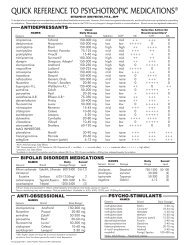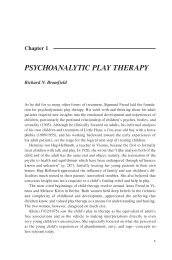IRAQ WAR CLINICIAN GUIDE
Iraq War Clinician's Guide - Network Of Care
Iraq War Clinician's Guide - Network Of Care
Create successful ePaper yourself
Turn your PDF publications into a flip-book with our unique Google optimized e-Paper software.
Iraq War Clinician Guide 86 Impact of Deployment on Family<br />
controlled but honest fashion. Children can better formulate their own responses by<br />
understanding how the non-deployed parent is coping.<br />
o it can be helpful to younger children in appreciating the finite nature of a deployment by<br />
devising developmentally appropriate time-lines. One way this can be accomplished is<br />
through the use of "countdown" calendars that allow children to mark off each day that<br />
passes, highlighting both the time that has passed since departure and the time remaining<br />
until return.<br />
R<br />
Support form the child's outside social structure is important as well. A close relationship<br />
with the school and the child's teacher($ will help others who share the child's day<br />
understand what the child is going through.<br />
o Non-deployedparents need to take care of themselves so that they can be available to<br />
their children. Utilization of community and extended family resources, as available both<br />
within and outside the military system, can be extremely important for the non-deployed<br />
parent. Professional assistance should be sought out if the parent or the child is not<br />
adjusting well to the deployment. Multiple resources are available to the military family<br />
during deployments. The Family Assistance Center, Deployment Support Croups, Unit<br />
Command, Family Advocacy Program, Military Medical Clinic, Military Mental Health<br />
Services, Military Chaplains or other religious organization support, and the Youth Center<br />
are just a few examples of available resources.<br />
Conclusions<br />
Although the impact of deployment on families may be considerable, most families adjust well.<br />
The responses to the multiple stages of deployment depend upon the stability of the family unit<br />
prior to the deployment, the developmental ages of the family members, the availability of internal<br />
and external resources and the willingness of the family to use them. Clinicians need to be aware<br />
of these issues when working with families of deployed soldiers in order to identify those families<br />
that may need additional services.<br />
DEPARTMENT OF VETERANS AFFAIRS<br />
NATIONAL CENTER FOR PTSD




